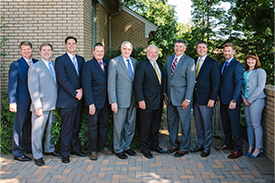DIVORCE

Examples of Family Law Issues We Represent
- Marriage
- Divorce
- Child custody and visitation
- Child support
- Spousal support/Alimony
- Division of property
- Post-judgment modifications
- Prenuptial Agreements
- Cohabitation Agreements
- Adoption
Divorce Attorneys in Richmond, VA
Understand the Basic Issues Involved in Divorce
Deciding to pursue divorce is one of the most difficult and emotional decisions you will ever make, particularly if you have children. Divorce also involves financial matters that must be resolved and legal issues that must be addressed. A family law attorney at CowanGates in Richmond, Virginia, can help you to understand the basic issues involved in divorce and to use a rational approach to the divorce process.
Grounds for Divorce
Traditionally, a person filing for divorce had to prove grounds (fault) to obtain a divorce. Today, the majority of states allow at least one form of no-fault divorce that does not require proof of fault. If no-fault divorce is available in your state, either you or your spouse may obtain a divorce even if one of you does not consent.
Some states may require a legal reason for divorce. These are called fault-based divorces. Those states requiring a showing of fault have statutes that specifically outline the different types of conduct that are required before a divorce can be granted. Some of the more common types of fault that may be grounds for divorce are adultery, mental illness, conviction of a felony, abandonment, drug abuse, cruelty, impotency and bigamy. In some states, both fault and no-fault divorce are available, and some courts consider fault when determining the amount of spousal support owed by one spouse to the other.
Alimony, Spousal Support and Maintenance
Alimony, also known as spousal support or maintenance, is financial support paid by one spouse to the other. Because each state determines alimony differently, it is important to consult with an attorney in your state to determine what factors the court considers when deciding if, how much and to whom alimony will be paid.
There are essentially three types of alimony: permanent alimony, reimbursement alimony and rehabilitative alimony. Permanent alimony is an allowance for support and maintenance (such as food, clothing, housing and other necessities) of a spouse. When a party requests permanent alimony, he or she must establish his or her need for support and that his or her spouse has the ability to provide for part or all of the need. Reimbursement and rehabilitative alimony are paid for a shorter period and most likely provide less than the standard of living during the marriage. Rehabilitative alimony is designed to provide the means necessary to enable a spouse to refresh or enhance job skills necessary to become self-sufficient and to provide financial support while the spouse is obtaining necessary training.
The types of factors the courts consider vary from state to state. In fault-based states the respective fault of the parties may be considered in awarding alimony. Other factors include the length of the marriage and each party’s financial condition, age, health, education and employment opportunities. Of all the issues that need to be resolved to dissolve a marriage, alimony and property division are often the most difficult issues to negotiate successfully.
Division of Property
Property division is often one of the most difficult issues to resolve at the termination of a marriage. Each state has adopted one of two basic systems for distributing property: equitable distribution (sometimes called a separate property system or common law system) or community property. Regardless of the system used, each state has its own rules for dividing marital property. States differ as to how marital or non-marital, community, or separate property is defined. States also use different rules to decide how the property should be distributed. This is a complicated area of family law, and the advice and assistance of a family law attorney familiar with the property division rules in your particular state can be invaluable.
Contact a Family Law Attorney
Reaching the decision to end a marriage is always difficult. Once you do make the decision, it is in your interest to approach the divorce process from a rational, business-like perspective, which is extraordinarily difficult given the emotional issues with which you must also cope. Working with a family law lawyer at CowanGates in Richmond, Virginia, who is experienced in family law can help you to get through the process with less stress.
Our Midlothian, Virginia law firm has served divorce clients since 1977 and we’re ready to sit down with you, help identify your individual needs and goals, and provide the comprehensive, thoughtful legal advice you deserve. To speak with a lawyer at CowanGates about your family law concerns, please call 804-320-9100 or contact us online today.
CowanGates’ Family Law and Divorce Attorneys in Richmond, VA

